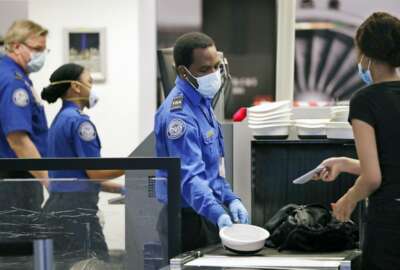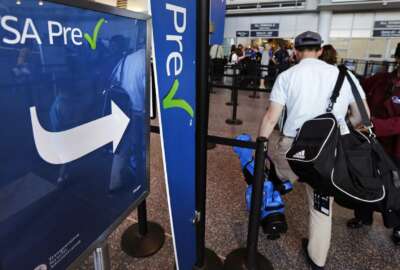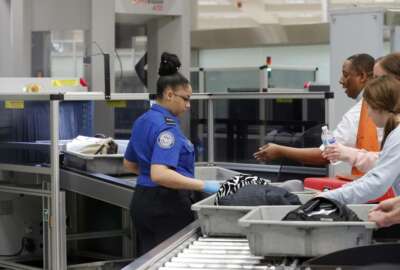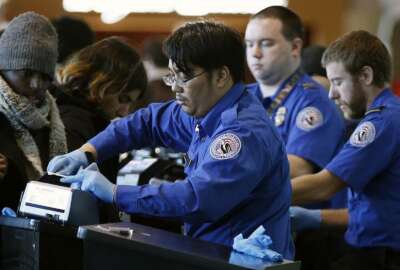
TSA officers score MSPB appeal rights under new agreement
Under a new agreement between the agencies, screening officers at the Transportation Security Administration can now appeal certain firings, demotions and...
Screening officers at the Transportation Security Administration can now appeal certain firings, demotions and long-term suspensions to the Merit Systems Protection Board, per a new agreement between the agencies.
This means all fulltime and part time transportation security officers, including lead, master, expert and supervisory TSOs, will be able to appeal an adverse action to the MSPB, as long as the officers have made it through their probationary period.
TSA officers didn’t have MSPB appeal rights until now. The agreement between the two agencies will allow the officers to appeal a disciplinary action made on or after Sept. 26, TSA Administrator David Pekoske said.
“I am pleased to announce recent and upcoming changes which reinforce my desire to promote a culture founded on our core values of integrity, respect and commitment,” he said Monday in an email announcing the details to the TSA workforce.
The agreement represents the first tangible outcome from an order Homeland Security Secretary Alejandro Mayorkas made to TSA leadership back in June.
Mayorkas directed to TSA to expand collective bargaining rights, explore the possibility of paying TSOs General Schedule salaries and find a way to give screening officers MSPB appeal rights.
“Today is an exciting day for our union and TSA officers across the country,” Hydrick Thomas, president of the American Federation of Government Employees council that represents 45,000 TSOs across the country, said Monday in a message to its members. “For 20 years we’ve been fighting to have the same appeal rights as our managers and fellow federal employees at different agencies throughout the government. We’ve been fighting to be treated as equals, nothing more, nothing less.”
The union said it’s still waiting on a final determination from Pekoske, which is supposed to expand collective bargaining rights for TSA officers.
Unions and Democrats have pursued these outcomes legislatively for years.
When Congress first created TSA nearly 20 years ago, it specifically excluded TSOs from the General Schedule pay scale and Title 5 personnel system, which covers much of the federal workforce.
Congress instead gave TSA leadership broad authority to hire, appoint, discipline and set pay and promotions for TSOs. But the agency under multiple administrations hasn’t used those authorities — until recently.
In reaching the agreement with the MSPB, the two agencies cited an authority that both the TSA and the Federal Aviation Administration have to “use or accept services, equipment, personnel and facilities of any other federal agency.” Other agencies must cooperate in providing those services.
Under the terms of the new agreement, the MSPB will hear appeals from TSOs in the same manner it would with federal employees from any other agency. TSA will implement any final decisions that come from the board, and it will pay the MSPB each quarter for the costs of adjudicating the appeals.
Congress will have to ensure TSA receives enough funding to pay for the costs of allowing its officers to appeal to the board.
“Any expenditures by TSA in furtherance of its responsibilities under this MOA (memorandum of agreement) are subject to federal budgetary procedures and the availability of funds, which are controlled by applicable laws and regulations,” the agreement reads. “The parties expressly acknowledge that this MOA in no way obligates the United States Congress to appropriate funds to support the objectives stated herein.”
Currently, neither TSA or its employees will have the ability to appeal rulings from the MSPB’s administrative judges, because the board doesn’t have a quorum or any members to reconsider those initial decisions. President Biden has nominated three people to fill the board, but they haven’t made it through the Senate confirmation process yet.
Either TSA or the MSPB can terminate the MOA at any time “without cause,” meaning leaders under a subsequent administration could, for example, choose to end the agreement on their own — unless Congress codifies TSO appeal rights in law.
It’s why Rep. Bennie Thompson (D-Miss.), chairman of the Homeland Security Committee, applauded Monday’s agreement with the MSPB but vowed to work with the Senate and the Biden administration on permanent legislation.
Thompson is one of the lead sponsors of the Rights for the TSA Workforce Act, which would permanently move TSOs into the Title 5 personnel system, giving them the same pay rates that other federal employees have under the General Schedule.
Republicans, along with a blue ribbon panel TSA formed back in 2019, argue the General Schedule is too outdated and inflexible to resolve the agency’s longstanding challenges recruiting and retaining talent due, in part, to low pay and minimal opportunities to quickly rise the ranks.
The House passed a similar bill to the Rights for the TSA Workforce Act on two separate occasions, but the Senate has never considered it.
Senate Democrats have introduced a companion to the House bill, but it hasn’t advanced beyond that stage.
Copyright © 2025 Federal News Network. All rights reserved. This website is not intended for users located within the European Economic Area.
Nicole Ogrysko is a reporter for Federal News Network focusing on the federal workforce and federal pay and benefits.
Follow @nogryskoWFED






